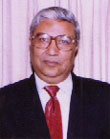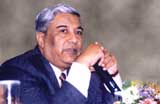The insurance merchant
By Venkatachari Jagannathan | 07 Feb 2001
 Heading a public sector insurance company is no more a cosy job! Mr. K.N. Bhandari, chairman and managing director of the Chennai-based United India Insurance Company, would vouch for that.
Heading a public sector insurance company is no more a cosy job! Mr. K.N. Bhandari, chairman and managing director of the Chennai-based United India Insurance Company, would vouch for that.
Today, he is swimming against the tide as the very existence of the company is being threatened by imminent competition. Financial institutions and banks - the bulk source of general insurance business - are themselves floating insurance companies, not to speak of other large industrial houses like Reliance and the Tata groups.
United India has predicted it would gradually lose premium to the tune of Rs. 1,000 crore over three years, due to competition. Last fiscal, the company clocked a gross premium of Rs. 2,390 crore. Further, the net incurred claim is expected increase to 90 per cent from the current 83 per cent, thanks to the private players who are likely to cart away profitable business.
To add insult to injury, established insurance companies like United India are also losing talented personnel to prospective players.
Given this scenario the mood of the employees in public sector insurance companies is pensive. Naturally, one finds them actively discussing voluntary retirement schemes (VRS), the compensation quantum, the emergence of new competition, the future of the company and their own.
But outspoken Mr. Bhandari, who is also the chairman of the newly-formed body of nationalised insurance companies, General Insurers (Public Sector) Association (Gipsa), is unperturbed. He is busy charting a new course for United India as well as for the other public sector units to take competition head on.
Among tight-lipped public sector insurance executives who shy away from meeting the press, Mr. Bhandari stands out. And he speaks his mind without any reservations. (See related article - ).
For instance the affable Mr. Bhandari, remarked, "The press has failed the nationalised insurance companies. It didn't appreciate our low premium rates, its underwriting losses and the contribution the industry made to the national economy."
But he is quick to gracefully accept the fact that most public sector insurance officials – including chief executives - lack the knack of interacting with the press. On the contrary, unions, opposing the opening up of the sector, informed the media about the nation-building activities of the insurance industry. He, however, hastily adds, "It is better to keep quiet than adding to the confusion till a final picture emerge."
 Born and educated in Jodhpur, Rajasthan, Mr. Bhandari is a rare breed. Not many corporate chieftains have led student unions during their college days. With a double degree in law and economics, Mr. Bhandari led the Jodhpur University students union during his college days.
Born and educated in Jodhpur, Rajasthan, Mr. Bhandari is a rare breed. Not many corporate chieftains have led student unions during their college days. With a double degree in law and economics, Mr. Bhandari led the Jodhpur University students union during his college days.
His hopes of legal practice at Jodhpur were dashed with the setting up of High Court Bench at Jaipur. Added to that was the sudden demise of his father. All this forced young Mr. Bhandari to look out for a job.
"Practising law needed some initial investment. Further, the family was in dire need of money," he recalls. When an offer to join General Assurance Society as a trainee officer came in 1963, he immediately latched took it up and travelled to Calcutta.
Like a fish taking to water instantly, Mr. Bhandari learnt the subject quickly. "Insurance is nothing but a variety of legal contracts. As a fresh law graduate I liked to deal with such contracts and interpreting them", he recalls.
Categorised as an administrative officer at the time of nationalisation in 1971, he was absorbed in National Insurance Company Ltd, Calcutta, where his career path began an upward movement. Five years after nationalisation, he was promoted as assistant manager/divisional manager – a post that brought to the fore his marketing prowess.
"Insurance marketing is nothing great. Three things are important to succeed viz. knowledge about the product, the target segment and prompt after sales service. Wrong promises - other than what is made by the policy- will not work in the long run," he
remarks.
Practising what he believed Mr. Bhandari began garnering new business. The divisional office, which had clocked a premium income of Rs 70 lakh when he took over, soon became a Rs. 7 crore-premium division.
"I was associated with all the major projects that came up in eastern region", he claims proudly. In the process he also left his mark for others to follow. For the first time in Indian insurance history National Insurance issued a dollar denominated policy to Haldia Petrochemicals and naturally Mr. Bhandari was a major force behind drafting the insurance cover for the mega project.
Opines Mr. R. Ramalingam, director, United India, "He is a tough negotiator. Further he has a total vision for the industry as to where and how it should proceed."
His vision for the company can be gauged by the fact that he appointed a committee under the chairmanship of Mr. K.P. Geethakrishnan, former finance secretary, to draw the road map for United India in the competitive environment. No other public sector insurance company has done that till date.
Mr. Bhandari's tough negotiating skills came to the fore last year while insuring ONGC's assets. The achievement is still talked about in the industry.
Having won the mandate from the domestic oil major, United India invited tenders from overseas insurance brokers to find re-insurers for the ONGC risk. At the time of finalising the broker, a big fire broke out in one of the ONGC oil well resulting in a loss of $70 million.
Faced with the broking firm playing truant and demanding a higher premium, Mr. Bhandari kept his cool and got them to agree to the same terms on the threat of calling for re-tendering. In the process he saved ONGC several crore of rupees.
Once again, with the oil major’s insurance policy due to expire in March this year, Mr. Bhandari is confident of bagging the mandate.
Be that as it may, with competition knocking at his doors Mr. Bhandari is now busy charting a new course for his company as well as for the industry. In some areas both are interlinked.
While he has aggressive plans to reduce the cost of operations of the company (see related article - ) he also has ideas that are staggeringly different from the way public sector insurance companies are said to think.
The Gipsa chief also believes that, with the annual reinsurance premium being to the tune of $400 million, India can have another reinsurance company so that the country becomes the reinsurance hub for the Asian region.
Mr. Bhandari is also talking with Life Insurance Corporation of India and a foreign player to float a joint venture health insurance company to sell life insurance product bundled with health insurance benefit. It should noted that HDFC Standard Life which started operations recently has a similar product.
Not many are enthused by this idea, though. According to Mr. R. Ramakrishnan, a noted consultant actuary, "Given the rampant bogus mediclaims lodged with general insurers with active connivance of doctors and hospitals such a policy will result in huge losses." Interestingly, United India has blacklisted around 20 private hospitals/nursing homes that were found colluding with unscrupulous elements to make false claims.
"Even the big private hospitals start fleecing when it comes to know that the patient has an health insurance cover," bemoans Mr. Bhandari.
In order to streamline the health insurance segment, the company is in the process of tying up with couple of third party administrators (TPA) to take care of the claims processing and settlement. The TPA will also negotiate with the hospitals with regard to their tariff. This will bring in some sort of standardisation in hospital charges that is absent now.
With a year and two months to go before his retirement, it is commendable that Mr. Bhandari is pulling out all stops to beat the competition, instead of biding his time like most public sector chief executives do. This may well be his way of leaving an imprint in an industry where he spent his entire career.
Father of two daughters and a son Mr. Bhandari says that he is not ambitious to join any private sector company or start his own broking business after retirement. He also does not feel bad on being passed over for the opportunity of heading the country's largest general insurer, New India Assurance Company, when its top slot fell vacant. It is the industry's convention that the most experienced chairman and managing director be posted as the chief of New India.
"I don't have any regrets. God has been kind to me all these years and I will be happy to lead a peaceful retired life", he says.



















